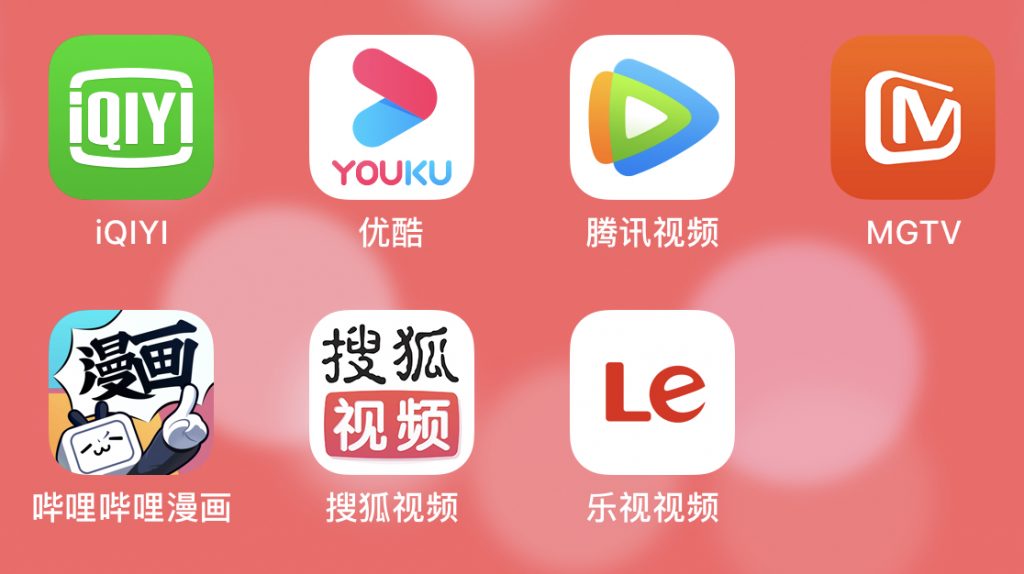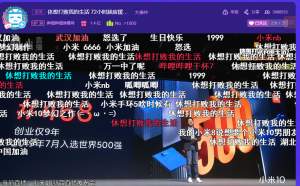
Three big players and several smaller services compete in Chinas video-streaming industry
While the U.S. market braces for the coming “streaming wars,” which will see contenders such as Disney, Apple, and other media giants attempting to chip away at the dominance of Netflix, China has long offered a more diversified ecosystem for online video content, with no single service yet coming close to attaining a market share comparable to Netflix’s 87 % in the U.S.
Netflix doesn’t operate in China. Instead, the bulk of the domestic market is split between iQiyi, Youku, and Tencent Video (known collectively as Aiyouteng, 爱优腾), which are respectively controlled by the country’s “big three” internet companies, Baidu, Alibaba, and Tencent (aka “BAT”).
Just a few years ago, it was relatively easy to differentiate between the services and their specific content emphases: While all had some original programming, much of their appeal came from licensed content: iQiyi had the hottest Korean dramas and movies; Tencent had HBO shows, the best of Britain, and NBA games; while Youku briefly fell behind in the bidding wars for overseas content.
Nowadays, content strategies are converging as these sites move away from spending on imports — which may be subject to restrictions from state regulators — and invest more in original productions, jumping on the latest domestic programming trends (often at the same time). The big three also face competition from smaller services that have upped the quality of their original programming, such as Mango TV, Bilibili, Sohu, and Xigua Video (Bytedance’s foray into long-form video).
The rise of content tailored to mainland China provides greater opportunities for brand integrations that speak directly to consumers in that vast market. In doing this, it is important for brand owners to understand the strengths of each platform and the relative advantages each offers, as these can help to guide decisions on potential placement opportunities.
Each service will be profiled separately in the second part of this report. Below we introduce key features of the Chinese video streaming market that brand owners should be aware of:
- Brand integrations, including product placements on scripted series, operate on an ad-buying model controlled by the platforms. This is very different from industry practices in the U.S., where brands more often work directly with producers to place products into shows and often no money changes hands. Brands in China pay for varying levels of exposure, and their broadcast presence is counted in seconds.
- Chinese productions rely more heavily on advertisers and sponsorships. Brand money is often integral to funding productions, rather than “rainy day money” for production extras. In some cases, non-scripted shows will start airing even as the producers seek to recruit additional sponsorship support.
- All of the major sites in China offer free, ad-supported versions, and increasing the number of paid subscribers has been a priority as content costs rise. In the drive for paying members, streaming services team up with other major companies to offer discounted joint memberships, such as Tencent Video’s recent partnership with retailer Suning. In that promotional deal, consumers were offered dual VIP member status for only RMB 99 (US$14) for one year, compared to RMB 497 (US$70) for memberships purchased separately. Tencent has also given existing members opportunities to watch episodes of popular shows in advance for additional fees, which has drawn the ire of some viewers.
- There is far more content sharing across platforms than in the U.S. The Chinese market abounds in deals between rival streaming services, as well as with major satellite networks, so it’s not uncommon to see several of the top-rated shows running on at least one satellite channel and one or two streaming platforms. In some cases, shows are co-produced by a network and streaming service, while in others one party will license the content from the other. With the current government-mandated focus on patriotic content for the 70th anniversary of the founding of the People’s Republic of China on October 1, streaming sites have been setting aside their own content to offer officially approved television programs with themes that celebrate the nation.
- Most drama series are released in a single season with a large number of episodes available over a condensed period of several weeks, encouraging a sort of binge-watching, but not extending audience anticipation and engagement over many years in the way top U.S. series such as “Game of Thrones” are able to. This partly reflects an emphasis on short-term gains at the expense of carefully thought-out productions, and it is common to see popular celebrities as the main draw with producers depending on the ‘fan economy” to draw viewers. Reality shows are more likely to air over an extended period and, if successful, will be renewed for multiple seasons.






